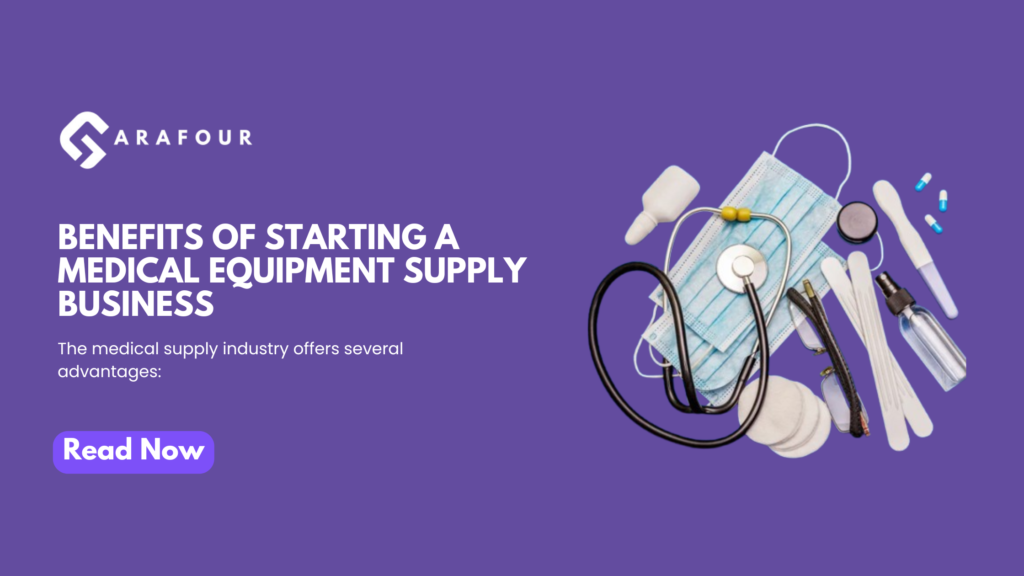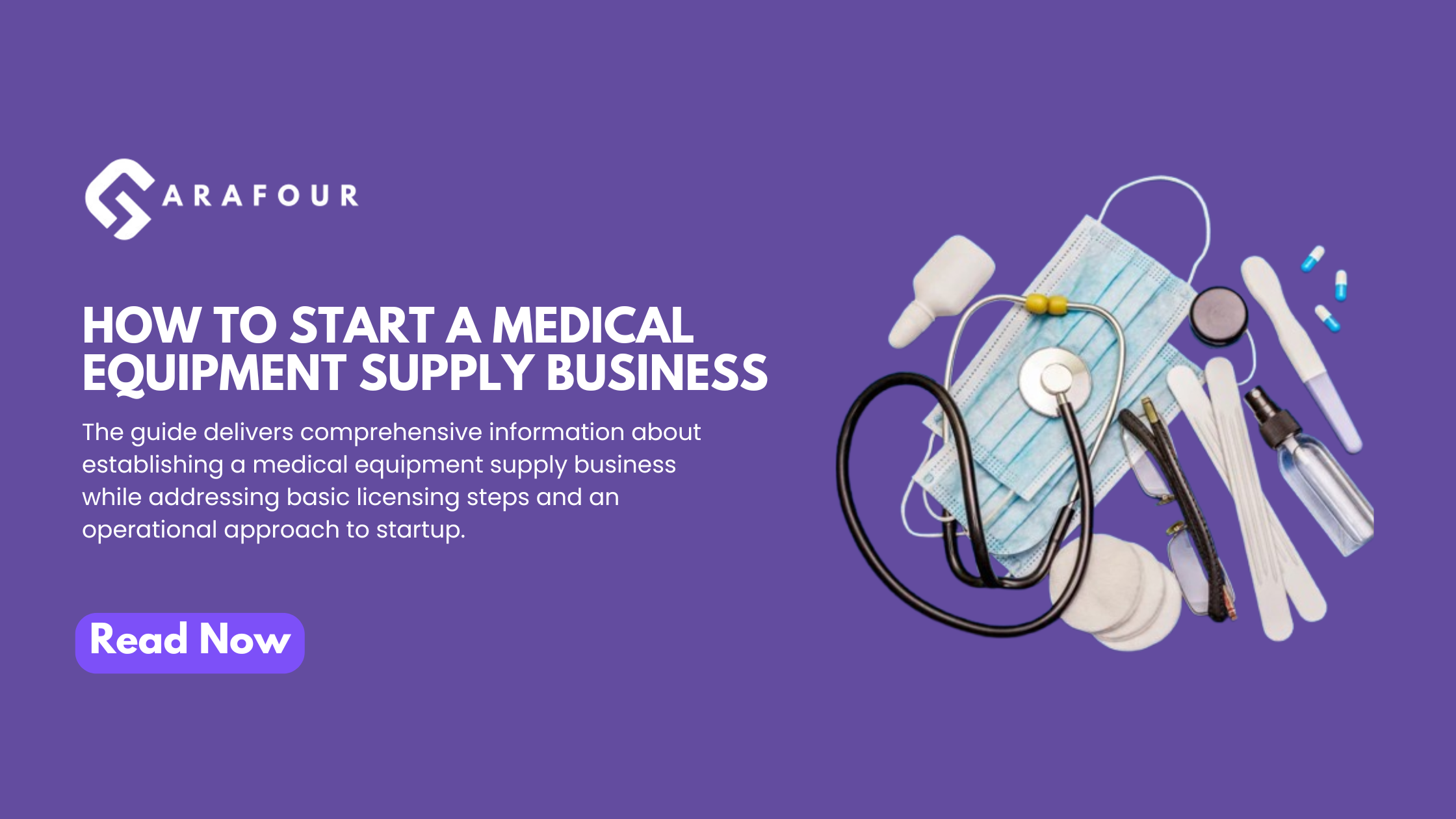How to Start a Medical Equipment Supply Business
Medical equipment supply constitutes a profitable, high-demand sector in the United States where healthcare facilities, as well as nursing homes and patients, rely on essential tools and devices for medical diagnosis, treatment, and patient care. The rising necessity of high-quality healthcare has driven up medical equipment requirements, thus creating an ideal business opening for startup entrepreneurs.
Establishing a medical equipment supply business demands proper strategic development, coupled with financial resources and adherence to regulatory standards. Each individual step, from market analysis to supplier relations, is crucial for sustained profitability.
The guide delivers comprehensive information about establishing a medical equipment supply business while addressing basic licensing steps and an operational approach to startup.
Understanding the Medical Equipment Supply Business
Medical equipment describes medical tools together with healthcare instruments and diagnostic machines that providers use to perform medical operations and record patient health parameters for medical treatment. The product line of medical equipment spans basic thermometer devices to sophisticated diagnostic technology such as MRI scanners.
Types of Medical Equipment
- Diagnostic Equipment: X-ray machines, MRI scanners, ultrasound devices
- Surgical Instruments: Scalpels, forceps, anesthesia machines
- Home Healthcare Equipment: Wheelchairs, oxygen concentrators, hospital beds
- Personal Protective Equipment: This includes gloves together with masks and face shield products and gowns.
Separate healthcare subcategories have different medical functions, so business owners must learn these distinctions to make successful product choices.
Business Models in Medical Equipment Supply
Medical equipment supply operates under various operational models.
- Wholesale Distribution: Selling products in bulk to hospitals, clinics, and pharmacies.
- Retail Sales: Operating a physical or online store for direct-to-consumer sales.
- Dropshipping: As a dropshipping model you partner with producers who handle direct product deliveries to customers.
- Rental Services: Leasing high-value medical equipment to healthcare providers.
Choosing the right model depends on your budget, target audience, and operational capacity.
Step-by-Step Guide to Starting a Medical Equipment Supply Business

Step 1: Conduct Market Research
Start your business only once you know how much people want your product and who sells similar goods.
- Identify Target Customers: Determine which medical facilities and individual customers you will work with.
- Analyze Competitors: Study what current supply companies provide and understand what the market needs.
- Determine Product Demand: Research which medical supplies patients and healthcare facilities require most often such as surgical tools, diagnostic tools, and home healthcare essentials.
Step 2: Develop a Business Plan
A properly planned business strategy will guide your business operations. It should include:
- Business Objectives: Define your goals and target market.
- Product Selection: Identify which medical equipment you will offer for sale.
- Pricing Strategy: Set prices that match market competition yet keep your business profitable.
- Financial Plan: Determine the total budget requirements for opening your business and identify all expected costs.
- Marketing Strategy: Describe your promotional methods to reach potential clients.
Step 3: Register Your Business and Obtain Licenses
You must get legal approval by registering your business and receiving the required permits.
- Business Registration: Choose a suitable business structure (LLC, corporation, or sole proprietorship).
- FDA Compliance: You need to confirm that your medical equipment follows FDA requirements.
- Tax Identification: Get an Employer Identification Number (EIN) to handle tax matters properly.
- State and Local Licenses: Contact your state and local government offices to know if you need further permits.
Step 4: Find Reliable Suppliers and Manufacturers
Selecting reliable medical supply partners helps you get products of high quality and maintains their availability.
- Work with Certified Manufacturers: Choose suppliers who act according to medical production standards.
- Negotiate Pricing and Terms: Speak with vendors to achieve the best wholesale prices while improving delivery conditions.
- Verify Product Quality: Check if all supplied equipment meets healthcare safety requirements.
Step 5: Set Up Your Distribution and Storage Facility
You must establish a safe method for keeping medical gear easily accessible.
- Warehouse Setup: Find a place with suitable storage space by either leasing or buying it.
- Inventory Management System: A software system helps you monitor your available products and outstanding orders.
- Shipping and Logistics: Pick delivery services are known for quick shipping to serve clients better.
Step 6: Market Your Medical Equipment Supply Business
To create demand from potential customers, you require effective marketing plans.
- Build a Professional Website: Establish an expert website to show your product line and business offerings.
- Utilize SEO and Content Marketing: Promote your website on search results by using keywords that match your website content.
- Leverage Social Media: Promote your business on platforms like LinkedIn, Facebook, and Instagram.
- Send Email Campaigns: Use email to tell your audience about new products plus your special deals and sales.
- Invest in Paid Advertising: Enhance your online reach with Google Advertising to find possible buyers.
- Network with Industry Professionals: Go to healthcare trade shows to meet suppliers and build industry relationships.
Step 7: Manage Operations and Scale Your Business
Once your business is running, focus on efficiency and expansion strategies.
- Provide Excellent Customer Service: Build strong relationships with clients.
- Expand Your Product Range: Offer more medical equipment based on market needs.
- Explore Government Contracts: Supply medical equipment to public healthcare facilities.
- Partner with Hospitals and Pharmacies: Secure bulk supply agreements for consistent sales.
Benefits of Starting a Medical Equipment Supply Business

The medical supply industry offers several advantages:
- High Market Demand: The expanding healthcare market creates persistent market demand because of a growing healthcare industry.
- Stable Revenue: Hospitals and clinics maintain stable revenue from recurrent purchase orders.
- Scalability: Expand into new product categories over time.
- Multiple Business Models: The business can operate through different models which include wholesale distribution together with retail outlets or online e-business storefronts.
FAQs
Can I begin my medical supply company from my house?
Starting an online medical supply business at home is achievable with supplier partnerships that handle shipment processes. However, even with an online medical supply business, you need to follow legal requirements.
Where can I locate medical equipment suppliers?
You can discover suppliers from manufacturers as well as wholesale distributors and authorized government suppliers. Medline and Henry Schein act as large medical supply providers alongside McKesson.
What approaches will bring new customers to my medical supply business?
To gain more customers, use online ads and SEO, team up with healthcare staff, and attend medical industry events. You can also team up with hospitals or clinics.
Is business insurance required to run a medical supply business?
When running this kind of business, you should get general liability insurance, plus product liability insurance and business insurance, to lower your risks.
Can I sell medical equipment internationally?
Yes, but selling internationally requires compliance with export laws and international regulations and obtaining necessary certifications for different countries.
Conclusion
To start a medical equipment supply business, you must develop a strategy while learning about this industry and meeting legal requirements. Every decision you make during product setup and market development contributes to achieving success in this business.
Following these steps will help you build a successful medical supply business that delivers what healthcare needs in America. With the right approach, this industry offers significant business potential and long-term growth.
If you need reliable medical supplies, check out Garafour today! We offer a wide range of products to support your healthcare needs.
Contact us for assistance with your orders or any questions you have. We’re here to help!.
Quick Links
Contact Us
Need help with your order & returns?
support@garafour.com
returns@garafour.com
+1 214 329-9119
Warehouse Locations
- Albany, NY
- Atlanta, GA
- Baltimore, MD
- Boston, MA
- Charlotte, NC
- Chicago, IL
- Columbus, OH
- Cleveland, OH
- Cranbury, NJ
- Dallas, TX
- Denver, CO
- Houston, TX
- Kansas City, MO
- Memphis, TN
- Minneapolis, MN
- Nashville, TN
- Orlando, FL
- Phoenix, AZ
- Download Wharehouse List






